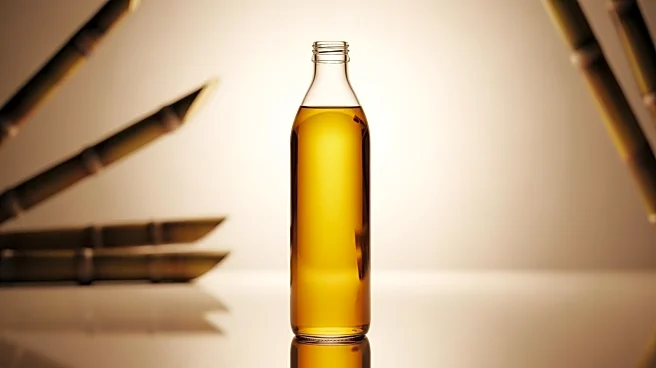What's Happening?
Coca-Cola has initiated the rollout of its signature soda made with U.S. cane sugar across select markets in the United States. This development comes after President Trump advocated for the return of real
cane sugar in Coca-Cola products. The beverage giant's Chief Financial Officer, John Murphy, indicated that the rollout would be gradual due to limited availability of cane sugar in the U.S. The move is part of Coca-Cola's innovation agenda, aiming to expand its product range with offerings made from U.S. cane sugar. Historically, Coca-Cola replaced cane sugar with high-fructose corn syrup in the 1980s due to high tariffs and corn farming subsidies. Mexican Coca-Cola, which uses cane sugar, is still imported into the U.S. but is considered a rarity and often comes at a higher price.
Why It's Important?
The introduction of cane sugar Coca-Cola in the U.S. marks a significant shift in the beverage industry, potentially impacting consumer preferences and market dynamics. This change could benefit U.S. cane sugar producers and alter the competitive landscape for sweeteners in the beverage sector. The move aligns with consumer trends favoring natural ingredients and could enhance Coca-Cola's brand image by offering a 'classic' taste. Additionally, President Trump's involvement underscores the influence of political figures on corporate decisions, highlighting the intersection of politics and business. The gradual rollout suggests a cautious approach, balancing consumer demand with supply constraints.
What's Next?
Coca-Cola's measured rollout of cane sugar soda may lead to increased demand for U.S. cane sugar, potentially affecting supply chains and pricing. The company may expand distribution based on consumer response and availability of cane sugar. Stakeholders, including sugar producers and competitors using alternative sweeteners, will likely monitor the market impact closely. Further developments could include adjustments in production strategies or new product launches to capitalize on consumer interest in natural ingredients. The beverage industry may see shifts in marketing strategies as companies respond to changing consumer preferences.
Beyond the Headlines
The reintroduction of cane sugar in Coca-Cola products may have broader implications for health and nutrition discussions, as consumers increasingly scrutinize ingredient lists. This move could spark debates on the health impacts of different sweeteners, influencing public policy and consumer advocacy. Additionally, the decision reflects a cultural shift towards nostalgia and authenticity in consumer goods, potentially affecting branding strategies across various industries. The role of political influence in corporate decisions may also prompt discussions on ethical considerations and transparency in business practices.










